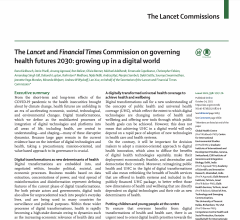
The Lancet and Financial Times Commission on Governing Health Futures 2030
The Lancet and Financial Times Commission & Youth and Media
Contribution by members of the Youth and Media team:
Executive Summary (full report here)
From the short-term and long-term effects of the COVID-19 pandemic to the health insecurities brought about by climate change, health futures are unfolding in an era of accelerating economic, societal, technological, and environmental changes. Digital transformations, which we define as the multifaceted processes of integration of digital technologies and platforms into all areas of life, including health, are central to understanding—and shaping—many of these disruptive dynamics. Because large gaps remain in the current evidence base on the interface of digital technologies and health, taking a precautionary, mission-oriented, and value-based approach to its governance is crucial.
Digital transformations as new determinants of health
Digital transformations are embedded into, and negotiated within, broader political, societal, and economic processes. Business models based on data extraction, concentrations of power, and viral spread of misinformation and disinformation represent defining features of the current phase of digital transformations. For both private actors and governments, digital tools also allow for unprecedented reach into people’s everyday lives, and are being used in many countries for surveillance and political purposes. Within these wider processes of digital transformations, health is rapidly becoming a high-stake domain owing to dynamics such as the increasing economic relevance of health data and the growing appetite for digital solutions in the healthcare sector, which have been substantially accelerated by the COVID-19 pandemic. Digital transformations have the potential to bring both enormous long-term benefits and substantial disruption in many different areas of health and health care—in fact, the effect of digital transformations has been so pervasive that it might soon become a dominant prism through which we can understand and address health and wellbeing dynamics. Digital technologies are already driving health transformations both directly (through their application in health systems, health care, and self-monitoring of health status and behaviours) and indirectly (through their influence on the social, commercial, and environmental determinants of health). Moreover, due to the influence that dynamics of digital access and literacy might have on health and wellbeing outcomes, we can consider the digital ecosystem itself as an increasingly important determinant of health.
A digitally transformed universal health coverage to achieve health and wellbeing
Digital transformations call for a new understanding of the concepts of public health and universal health coverage (UHC), which reflect the extent to which digital technologies are changing notions of health and wellbeing and offering new tools through which public health goals can be achieved. However, this does not mean that achieving UHC in a digital world will only depend on a rapid pace of adoption of new technologies in health care and health systems. On the contrary, it will be important for decision makers to adopt a mission-oriented approach to digital health innovation, which aims to diffuse the benefits of digital health technologies equitably, make their deployment economically feasible, and decentralise and democratise their control. Moreover, reimagining public health and UHC in the light of digital transformations will also mean rethinking the breadth of health services that are offered in health systems and included in the publicly financed UHC package, to better reflect those new dimensions of health and wellbeing that are directly dependent on digital technologies and their role as new determinants of health.
Putting children and young people at the centre
To ensure that everyone benefits from digital transformations of health and health care, there is an urgent need to orient digital health priorities towards the establishment of strong health and wellbeing foundations early in life. This objective will especially require adapting the health services that are traditionally considered part of UHC to reflect the needs and priorities of children and young people, which are likely to vary across age groups, communities, and levels of digital literacy. There are several reasons for putting children and young people at the centre of this effort. First, addressing the role of digital technologies as determinants of health already in early childhood will be crucial for reducing the social and economic burdens of disease later in life. Second, the health and wellbeing outcomes of children and young people are likely to be a litmus test for the capacity of societies to harness digital transformations in support of UHC for all people. Third, although there is no universal experience of growing up in a digital world, children and young people are generally those with the highest exposure to digital technologies. As such, they are both particularly exposed to potential harms that might derive from them and uniquely equipped to shape positive health futures through codesign of digital health solutions and participatory research and decision making.
A value-based framework for governing health futures
The massive challenges and opportunities posed by digital transformations of health and health care constitute a powerful call for governance at multiple scales, which should be grounded in core Health for All values of democracy, equity, solidarity, inclusion, and human rights. Upholding Health for All values through governance will help ensure that digital technologies enable health benefits, including positive transformation of UHC, improved access to and quality of health services, and more effective prevention and management of public health crises. However, if these values are to play a central role in shaping health futures, they must be strengthened and updated to reflect their specific relevance for, and intersection with, digital transformations.
Four action areas for sustainable health futures
The governance of digital technologies in health and health care must be driven by public purpose, not private profit. Its primary goals should be to address the power asymmetries reinforced by digital transformations, increase public trust in the digital health ecosystem, and ensure that the opportunities offered by digital technologies and data are harnessed in support of the missions of public health and UHC. To achieve these goals, we propose four action areas that we consider game-changers for shaping health futures in a digital world. First, we suggest that decision makers, health professionals, and researchers consider—and address— digital technologies as increasingly important determinants of health. Second, we emphasise the need to build a governance architecture that creates trust in digital health by enfranchising patients and vulnerable groups, ensuring health and digital rights, and regulating powerful players in the digital health ecosystem. Third, we call for a new approach to the collection and use of health data based on the concept of data solidarity, with the aim of simultaneously protecting individual rights, promoting the public good potential of such data, and building a culture of data justice and equity. Finally, we urge decision makers to invest in the enablers of digitally transformed health systems, a task that will require strong country ownership of digital health strategies and clear investment roadmaps that help prioritise those technologies that are most needed at different levels of digital health maturity.
